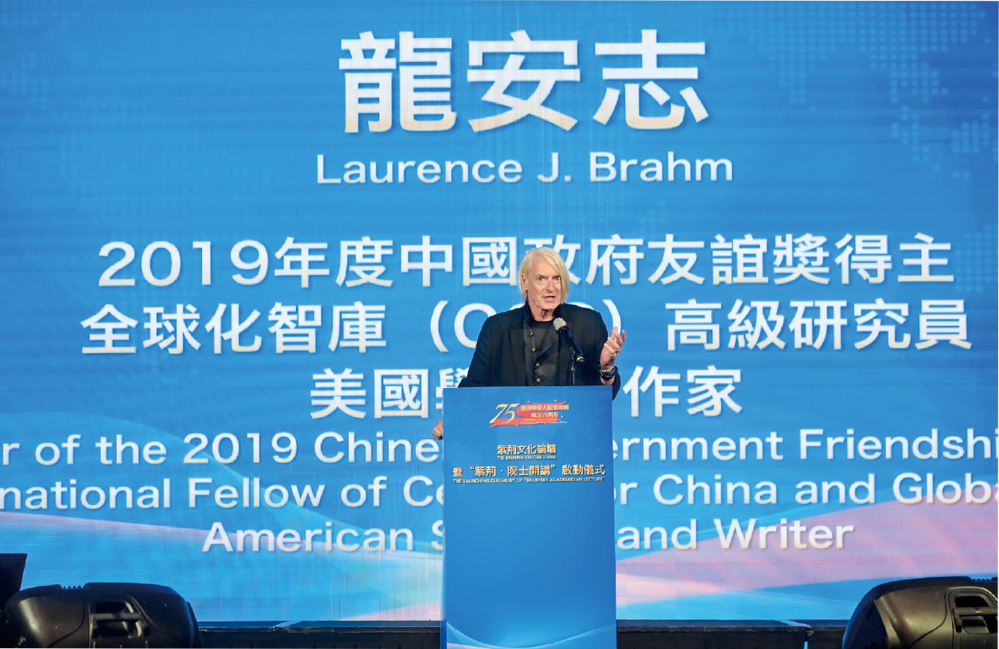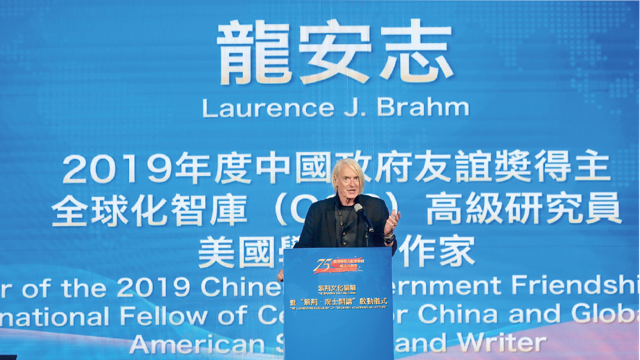Laurence J. Brahm: Hong Kong Uses Kung Fu Culture to Make China’s Voice Heard in the World ![]()
![]()
Author: Laurence J. Brahm (the USA)

In Brahm’s speech, he reviewed the history of ‘Ping-Pong Diplomacy’ between China and the United States, and outlined China’s development achievements. In his view, China needs to further strengthen its soft cultural diplomacy, and Hong Kong has a unique advantage in this regard with its Kung Fu culture, which should be used to make China’s voice heard and to tell China’s story to the world.
Let’s go back and remember that once upon a time there was something called the Cold War. After 1947, people did not talk to each other. The lack of communication led to a lot of misunderstandings, which led to distortions. And I remember, as a young student in 1971, there was a historical event called ‘Ping-Pong Diplomacy’. Through such a simple thing as sports and cultural exchange, suddenly Americans were seeing, on our black-and-white TV screens, images of China that we had no access to before. Americans did not know what China was like because we just did not have that communication. After ‘Ping-Pong Diplomacy’, we had Nixon’s visit to China. And then in 1979, there was finally a formalization of the China-US relations. Fortunately in 1981, I was one of the first wave of American students to come to China and begin to understand the culture.
Throughout the 1980s and 1990s, I was able to work as a lawyer. I graduated from the Law School of the University of Hong Kong, and worked in the area of helping foreign investments come into China. And every time you saw a joint venture, you saw the transformation of society. And then over time, I was able to serve at the State Administration of Foreign Experts Affairs, advicing on China’s economic development.
During the dynamic years of the 1990s, the socialist market economy system was created, merging the planning with the market. It was a combination of sometimes using planning and sometimes using more market to be able to improve people’s lifestyles and create benefits for all.
A lot of the American scholars said: “No, you cannot have planning and market together, you have to separate them.” They do not understand thoughts like ‘Yin Yang’—sometimes a little bit more planning, and sometimes a little bit more market—it is actually interchangeable. There is no need for duality in the ‘Yin and Yang’ philosophy; they are not two things but two aspects of one. Fast forward, I saw China facing a lot of new challenges with the new economic development. There was a concentration of people in the coastal areas and too much pressure on the coastal areas. The new policies began to use planning to drive the market and create a domestic economy in the interior.
This is another very important aspect of the Chinese philosophy. The Chinese culture says ‘Jin Mu Shui Huo Tu’, meaning you have a constant balance between the five elements that are always interactive. Seeking balance is a key aspect of the Chinese philosophy. As you move forward, you know that with every solution you often create new problems, and these new problems have to be solved with all the industrial development.
As we came out of the 1990s and into the new century, China was not only the factory of the world, but it is the investment bank of the world. Chinese investment is going everywhere, really revitalizing the world economy in many ways. But at the same time, China had a problem with pollution. One of the amazing things about the Chinese leadership with their pragmatic approach is that they are able to recognize a problem and respond to it very quickly.
Between 2013 and 2015, I worked as an advisor at the Strategic Policy Institute within the Ministry of Environmental Protection, working on a policy called “Integrated Reform Plan for Promoting Ecological Progress” (Ecological Civilization). Now, this policy was about how China would use the transformation of its grids away from fossil fuels, which at that time in 2013 was about 80% of China’s energy, to green energy, using new technologies and creating this transformation as a new growth trend.
Now, Ecological Civilization is not just a national policy, it is actually written into the constitution of the Communist Party of China, making it the greenest of all the green parties in the world. And the United Nations in their own independent assessment believes that because of Ecological Civilization and poverty eradication, China could become the only country in the world to achieve the United Nations’ 2030 Agenda for Sustainable Development Goals, also the only country that can actually do it.
So when we listen to some of the politicians in America saying that China needs to become a responsible global citizen, my answer is that China is a responsible global leader right now. But how does China get that message out to the world? That is really the challenge right now. We need to communicate. When thinking about how to communicate these ideas, China needs a new kind of diplomacy, a new kind of ‘Ping-Pong Diplomacy’ to break this kind of impasse currently, and to get America and China to come together. China needs a new kind of communication on a cultural level.
That is where Hong Kong has such an important role to play, because China cannot always use hard power, but the soft power. And remember that ‘Ping-Pong Diplomacy’—it was sports and culture that brought people together. Hong Kong is a city in China that has an asset that no other cities has. Everybody in the world loves Bruce Lee films, Jackie Chan films, and we have decades and decades of that culture that is part of the Hong Kong culture.
China can actually send some messages to the world, because some westerners say: we accept China’s economic model, but they do not have universal values.
What are universal values? Americans are saying we have some democracy between two parties that cannot do anything but fight. China now has probably some of the most advanced technology in the world and the most sophisticated communication systems. There are more misunderstandings and more fake news than ever before. How does China get around that? We have to have people-to-people communications, and that is why I come back to this idea of Kung Fu culture diplomacy—let’s bring people together. In this culture, we have concepts like ‘Yin Yang’ and ‘Tai Ji’. To represent these concepts, we have ‘Ba Gua’, which is an approach to change, and we also have concepts like loyalty and trust. These are Kung Fu concepts and you can see them in any Kung Fu film.
We need these second track dialogues to be able to reach out to the world and use the Hong Kong culture to reach out to everybody to win hearts and minds, because in martial arts, there is a very important concept: the internal strength is always stronger than the external strength. Internal energies and soft diplomacy will always be more effective than hard diplomacy.
I hope that Hong Kong can use its incredible assets of Kung Fu culture to speak to the world and change people’s minds, because people all over the world love it. American rappers love to use Kung Fu imagery in their music videos because it is something that stands for righteousness, justice and fairness. That is a very important part of the Chinese culture. We can see that fairness in the economic part of the policies, trying to lift everybody out of poverty, trying to give everybody a chance. And that is the message that we have to give to the world.
In the principle of the martial arts of Wing Chun, it always looks for a middle way. We have to tell the world that the way that China does things is never going to extremes. China is always looking for a middle way.
(This article is based on the speech given by Laurence J. Brahm, winner of the 2019 Chinese Government Friendship Award, Senior International Fellow of Center for China and Globalization (CCG), American Scholar and Writer, at the Bauhinia Culture Forum and the Launching Ceremony of the “Bauhinia Academician Lecture” held in Hong Kong on August 26th. This article was published in the November 2024 issue of Bauhinia Magazine. )
https://res.youuu.com/zjres/2024/10/31/yXCoQtOQW0j0UKlJUV00ghqm67WY1ZiUDTr.png











掃描二維碼分享到手機














